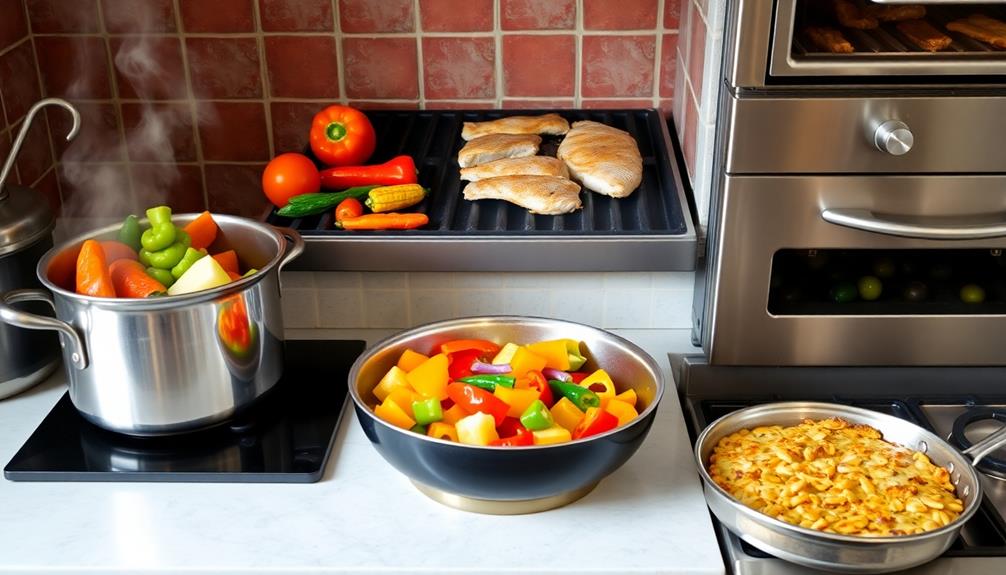Scent plays a surprising role in how you enjoy flavors, making every meal more delightful! Here's how it works:
- Smell enhances taste, adding depth.
- It contributes 75-95% to flavor experiences!
- Nostalgic scents can spark happy memories tied to food.
- Familiar aromas create anticipation and enhance enjoyment.
Imagine the smell of your favorite dish bringing back joyful moments with family. Food isn't just about taste; it's about emotions, culture, and connections! Chefs even use scents to make meals unforgettable. So next time you savor a dish, remember how scents make it special! If you stick around, you'll find out even more surprises!
Key Takeaways
- Smell accounts for 75-95% of flavor perception, significantly enhancing the overall taste experience of food.
- Familiar scents evoke nostalgia, creating emotional connections that deepen enjoyment of meals and flavors.
- Cultural backgrounds shape scent associations, influencing individual flavor preferences and food experiences.
- Pleasant aromas can create positive taste expectations, enhancing overall dining satisfaction and enjoyment.
- Overpowering scents may mask true flavors, highlighting the need for balance in culinary scent enhancements.
The Connection Between Smell and Taste

When you take a bite of your favorite dish, you mightn't realize that the rich flavors you enjoy stem largely from your sense of smell. Smell and taste work together like best friends, making your meals unforgettable!
You might think taste comes from your taste buds, which can only detect five basic flavors: sweet, sour, bitter, salty, and umami. But there's so much more to it! For instance, the aroma of a classic dish featuring tender lamb like cumin lamb can enhance the overall experience of savoring its spices and textures.
When you chew, tiny odor molecules travel from your food to your nose through a process called retronasal olfaction. This means that while you're enjoying a delicious bite, your nose is busy picking up all those yummy smells, which helps shape your perception of food.
Did you know that our noses have around 400 types of odor receptors? This is why losing your sense of smell during a cold can make food taste bland and dull.
Here are some important points to remember:
- Smell adds depth to the flavors you taste.
- Retronasal olfaction enhances your overall eating experience.
- Together, smell and taste create a delightful adventure for your taste buds!
Mechanisms of Flavor Perception

Understanding how flavor perception works reveals the intricate dance between taste and smell that transforms eating into a multisensory experience.
When you take a bite of your favorite food, like the aromatic Dadar Gulung or the rich Kue Putu, your tongue detects five basic tastes: sweet, salty, sour, bitter, and umami.
But here's the fun part—your sense of smell plays a huge role! In fact, it accounts for about 75-95% of what you perceive as the flavor of food.
As you chew, odor molecules travel through the retronasal passage to activate your olfactory receptors. This process helps you enjoy the full flavor of your meal, making it taste even better!
It's worth mentioning that if you can't smell well, like in cases of anosmia, your experience of flavor diminishes considerably.
But that's not all! The temperature and texture of food, along with delightful colors and sounds, also contribute to how you experience flavor.
Emotional Influence of Scent
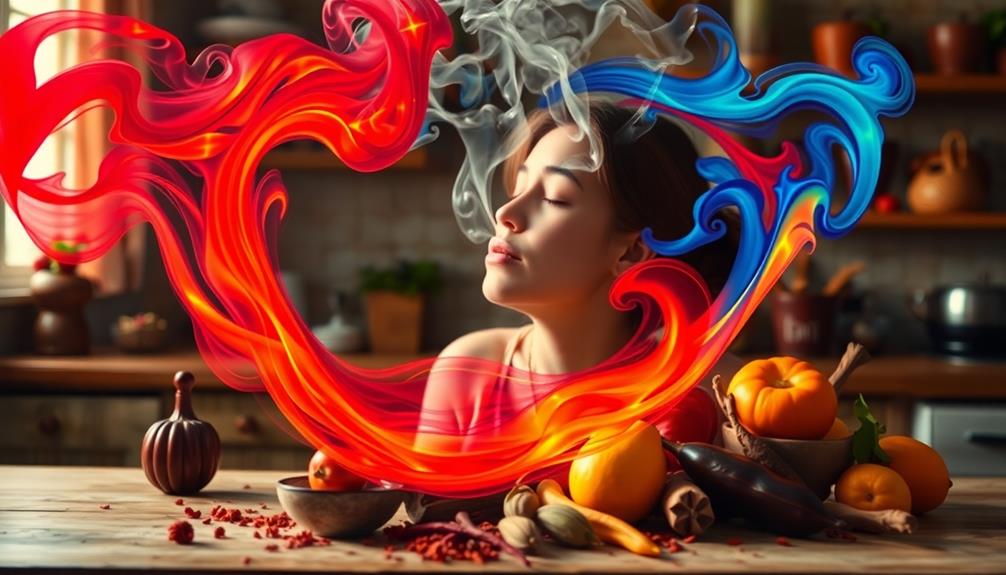
Have you ever caught a whiff of a familiar smell that took you back to a happy memory? Scents can spark feelings of nostalgia and remind you of delicious meals from your childhood, making every bite even more special.
For instance, the aroma of traditional Brazilian dishes like Caldeirada or Brigadeiro can evoke memories of family gatherings and celebrations.
Plus, different cultures have their own unique aromas that bring joy and excitement to our taste buds, showing just how powerful scent can be in shaping our love for food!
Nostalgia and Memory Triggers
Scents can transport you to vivid memories, often triggering a wave of nostalgia that connects you to cherished experiences.
Think about the smell of freshly baked cookies wafting through the air. It might remind you of cozy afternoons spent with family, or perhaps a holiday gathering filled with laughter.
These scents are more than just smells; they're powerful memory triggers. The aroma of spices, such as those found in Mushroom Masala, can evoke memories of family gatherings and festive meals, enhancing the emotional connection to food.
Did you know that our sense of smell is linked to emotions and memories? When you catch a whiff of a familiar aroma, it can spark feelings from your past.
Here are some ways scent influences nostalgia and memory:
- Childhood Favorites: Certain smells remind you of favorite meals your parents made, shaping your tastes today.
- Emotional Ties: Nostalgic scents enhance your enjoyment of food, connecting you to happy moments.
- Lasting Impressions: Early experiences with specific aromas can create lifelong food preferences.
Cultural Scent Associations
Cultural associations with scents can profoundly shape your emotional responses and food preferences. Each culture has its special scents tied to traditions, like cinnamon in baked goods, which can remind you of cozy family gatherings.
In Mexican cuisine, for example, the aroma of grilled corn can evoke memories of vibrant street markets where the beloved Mexican street corn is sold. These olfactory experiences create warm feelings and make you crave those delicious treats.
Did you know that your early experiences with scents, even before you were born, can influence what you like to eat later? If your mom enjoyed certain foods during her pregnancy, you might find yourself loving those same smells and flavors!
Language also plays a role in how you connect with scents. Some cultures have rich vocabularies for smells, which can deepen your appreciation for different aromas.
Here are a few fun points to remember about cultural scent associations:
- Scents can evoke memories from special occasions or holidays.
- Familiar aromas can enhance your enjoyment of food.
- Your cultural background shapes what you think smells good!
Emotional Responses to Aromas
The connection between scent and emotions runs deep, often tapping into memories tied to specific aromas. When you catch a whiff of something familiar, like freshly baked cookies or blooming flowers, it can trigger powerful emotional responses. These pleasant odors can fill you with warmth and happiness, making you feel nostalgic for times spent with loved ones.
For example, the aroma of Dorayaki (Red Bean Pancake) may evoke memories of childhood treats and family gatherings, enhancing your overall experience with food.
Research shows that the olfactory bulb, which helps you process smells, links directly to the limbic system in your brain. This connection explains why certain scents can enhance your mood and even influence your food preferences.
For instance, the smell of a favorite dish might remind you of family gatherings, sparking joy and a sense of belonging.
Cultural context also plays a role in how you react to different aromas. A scent may remind you of a special holiday or a cherished tradition, bringing back delightful memories.
Cultural Impact on Flavor

Flavor preferences are deeply influenced by the environments you grow up in, shaping your unique palate over time. Cultural influences play a huge role in how you see and taste different foods. From the moment you're born, your experiences with various smells and tastes create a special connection with food. This connection often evolves as you are introduced to new cuisines and ingredients, further broadening your taste horizons. Today, exposure to global dishes and innovative recipes through media and travel allows people to experiment with trending flavors in the food industry, from smoky chipotle to tangy yuzu. These evolving trends reflect a blend of cultural traditions and modern creativity, constantly reshaping how we experience and appreciate food.
For example, if your family enjoys spicy dishes, you might develop a love for bold flavors! The diverse culinary traditions found in different cultures, like the rich spices in Muamba De Galinha, further enhance this relationship and influence your palate.
Here are some exciting ways culture impacts flavor perceptions:
- Maternal Diet: What your mom eats while pregnant can shape your likes and dislikes even before you're born!
- Language: Some cultures, like the Jahai community, have a rich vocabulary for describing scents. This helps them appreciate flavors more deeply.
- Culinary Traditions: Different regions use unique ingredients, leading to a delightful mix of flavors. Imagine the joy of tasting a sweet mango in summer or a warm, spiced apple pie in fall!
The Role of Olfactory Memory
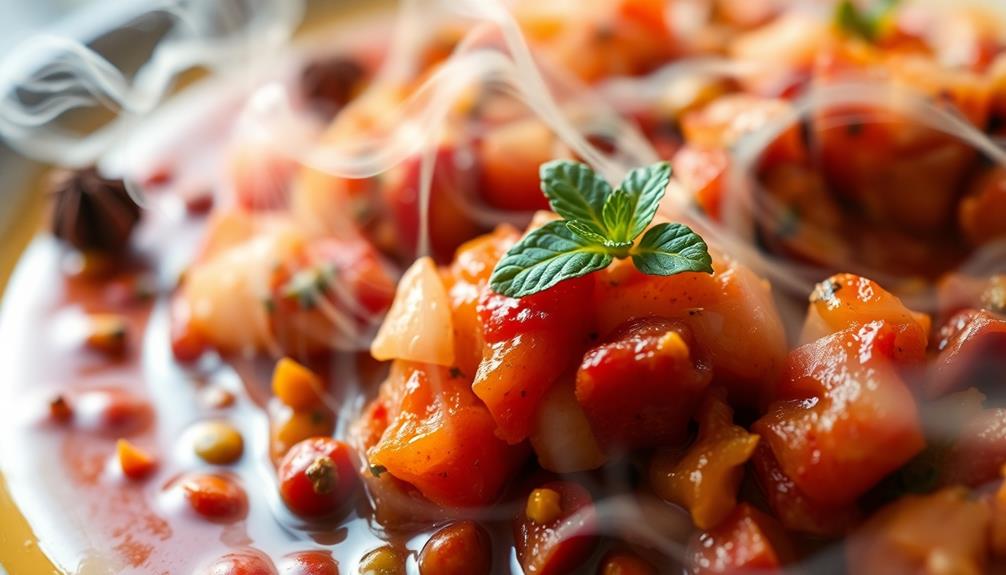
When you smell something delicious, like freshly baked cookies or a savory holiday feast, it can spark joyful memories and make you feel all warm inside!
Those scents not only bring back happy times but also shape what you expect from your favorite foods.
For instance, the aroma of a classic squash casserole can evoke family gatherings and potlucks, enhancing the flavor experience.
Nostalgic Food Associations
Nostalgia often weaves itself into our culinary experiences, creating a powerful link between scent and memory. When you catch a whiff of freshly baked cookies or simmering spaghetti sauce, it might spark nostalgic memories of family gatherings or special occasions.
Isn't it amazing how just one scent can transport you back in time? The aroma of dishes like Txakoli can also evoke memories of seaside meals, enhancing the flavor of seafood with its bright notes.
Food nostalgia happens when certain aromas remind you of meaningful moments. Here are some ways scent plays a role in your food experiences:
- Triggers Memories: Scents can bring back vivid memories, making you feel warm and happy.
- Enhances Flavor: When you link a specific smell to a cherished memory, it amplifies the taste of that food, making it more enjoyable.
- Shapes Preferences: The scents you grew up with can influence the foods you love today.
Imagine sitting around the dinner table, surrounded by the comforting scent of your favorite dish. That connection makes eating not just about taste but also about joy, love, and shared experiences.
Scent-Triggered Flavor Expectations
The aroma of a dish can set the stage for your entire dining experience, shaping what you expect to taste long before the first bite. Scent-triggered flavor expectations play a big role in how you perceive flavors. When you catch a whiff of a familiar smell, it can bring back memories and feelings that make you enthusiastic to eat. This connection is all thanks to olfactory memory!
Here are some ways scent influences your experience of taste:
- Nostalgic Smells: A whiff of freshly baked cookies can remind you of Grandma's kitchen.
- Flavor Match: If a dish smells like it should taste delicious, you're more likely to enjoy it.
- Anticipation: The scent can build excitement, making you keen for that first bite.
- Emotional Connection: Certain aromas can evoke feelings of happiness or comfort, enhancing the meal.
Chefs often use these scents to create memories and emotions, making your meal even more special.
Culinary Innovations and Techniques
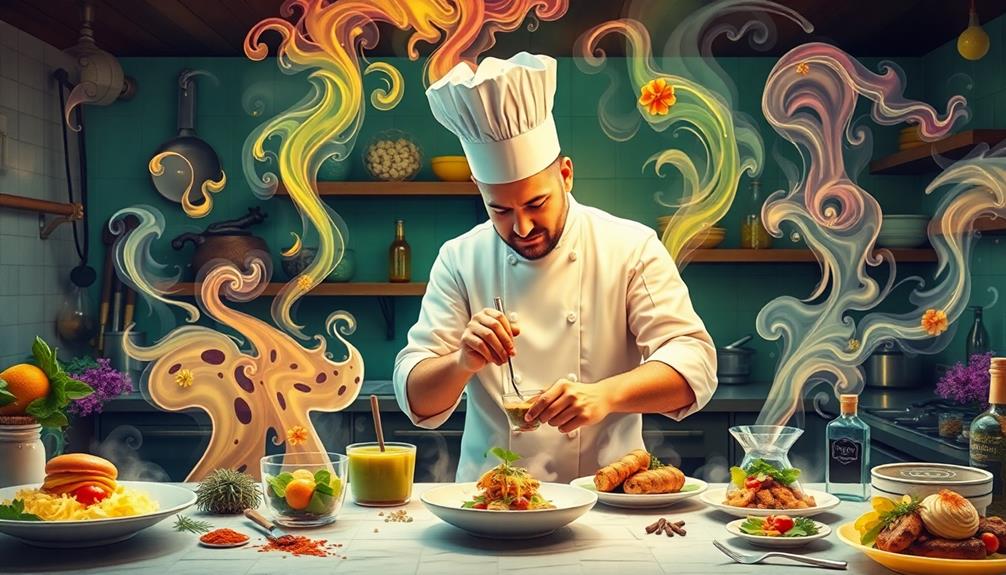
Culinary innovations are transforming how we experience food, with techniques that engage all our senses. Chefs like Rory Macdonald are using exciting culinary techniques, such as molecular gastronomy, to enhance the scent of dishes before you even take a bite.
Imagine the aroma of eucalyptus mixed with olive oil wafting through the air—this combination can make flavors pop and turn an ordinary meal into something extraordinary! Additionally, many chefs are incorporating creative food presentations, such as themed dishes for special occasions like Halloween, to further stimulate your senses and elevate the dining experience, such as a Graveyard Taco Dip that delights both the eyes and the palate.
Here are some ways scent enhances flavor perception:
- Essential Oils: Chefs use these to add delightful smells that make you enthusiastic to taste.
- Liquid Nitrogen: This fun technique creates dramatic, aromatic clouds that surprise and delight your senses.
- Scent Pairings: By pairing scents with foods, chefs help you remember special moments tied to meals, making the experience even more heartwarming.
Innovative bakeries and restaurants know that scent can boost customer smiles and even increase sales. When you walk in and smell freshly baked bread, it's hard to resist!
Limitations of Scent in Dining

While enhancing dining experiences with scent can be enchanting, it's crucial to recognize its limitations. Scent can truly elevate flavor perception, but there are times when it mightn't be the best fit for your meal. Here are a few things to keep in mind:
- Strong cooking aromas, like those from beef bourguignon, might already be enough on their own.
- Overpowering scents can overwhelm your guests, hiding the delightful flavors of your dish.
- Not every meal benefits from extra aromas; finding the right balance is key to avoiding an unpleasant mix.
- Consider your guests' feelings, as some may not enjoy scent enhancements.
When you think about your dining experience, remember that scent is just one part of the puzzle.
Sometimes, the natural aromas of the food are all you need to create a memorable meal.
So, while it's fun to play with scent, always keep in mind how it fits into the overall experience.
After all, the joy of dining comes from enjoying good food with loved ones!
Future Research Directions
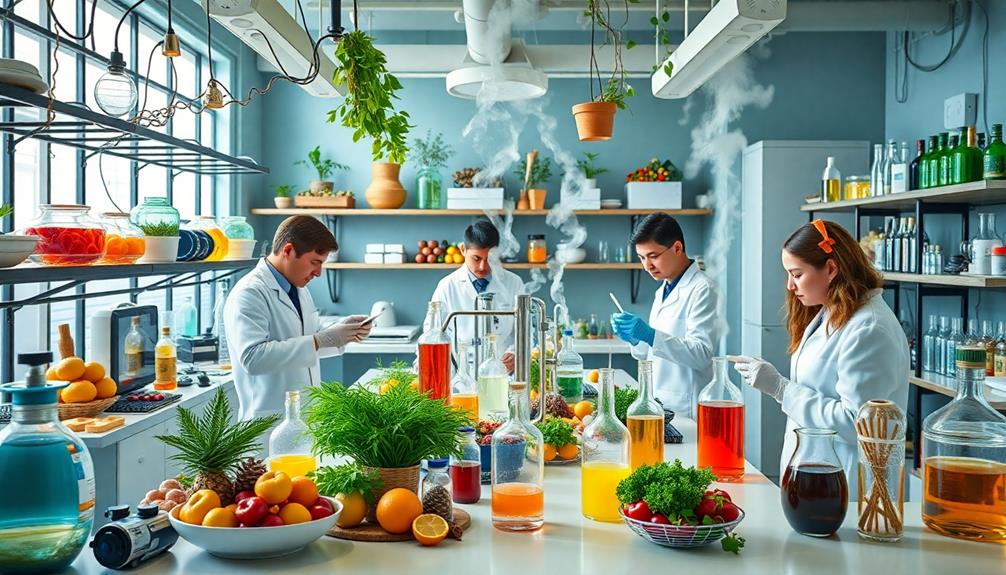
Recognizing the limitations of scent in dining opens the door to exciting future research directions. Imagine diving deeper into how our olfactory and gustatory systems work together! Researchers could explore how different scents lead to unique flavor preferences. This could help create personalized dietary recommendations, making meals even more enjoyable for everyone.
Here are some areas to examine for future studies:
- Cultural and Emotional Influences: How do cultural backgrounds shape our scent-related flavor preferences? Understanding this can help tailor dining experiences.
- Environmental Factors: What happens when we change the scents in a dining setting? Researching how ambient scents affect flavor perception could lead to tastier meals!
- Neurophysiological Mechanisms: By uncovering the science behind scent-flavor interactions, we might find ways to assist those with taste and smell disorders.
- Culinary Innovation: How can chefs use scent in food marketing? Strategic scent integration might make meals even more delightful and engaging.
With these exciting directions, the future of food can be bright, flavorful, and full of surprises! Let's look forward to what delicious discoveries await us!
Frequently Asked Questions
Does Smell Affect Taste Perception?
Yes, smell greatly affects your taste perception. When you eat, aromas travel through your nasal cavity, enhancing flavors. If you block your nose, you'll notice that food tastes duller and less enjoyable.
What Are the Factors Affecting Flavor Perception?
Flavor perception's like a symphony; texture, temperature, and spiciness play their notes. Color paints your expectations, while sounds and environment shape the experience. Your cultural background adds unique rhythms, making every bite a personal masterpiece.
In What Ways Can the Sense of Smell Change the Perception of Taste?
Your sense of smell directly alters how you perceive taste. When you inhale aromas, they enhance or diminish flavors, shaping your overall eating experience. A blocked nose can make even the tastiest food seem bland.
How Does Odor Contribute to the Perception of Flavor?
Did you know that 75-95% of what you taste actually comes from your sense of smell? When you chew, odors travel to your nasal cavity, blending taste and scent to create a richer flavor experience.
Conclusion
So, the next time you enjoy a tasty treat, remember that smell plays a huge role in how you experience flavor! Did you know that about 80% of what you taste actually comes from your sense of smell? That's pretty amazing! Whether it's the sweet scent of cookies baking or the fresh aroma of pizza, these smells can make your food taste even better. So, let your nose lead the way to delicious adventures in every meal!


